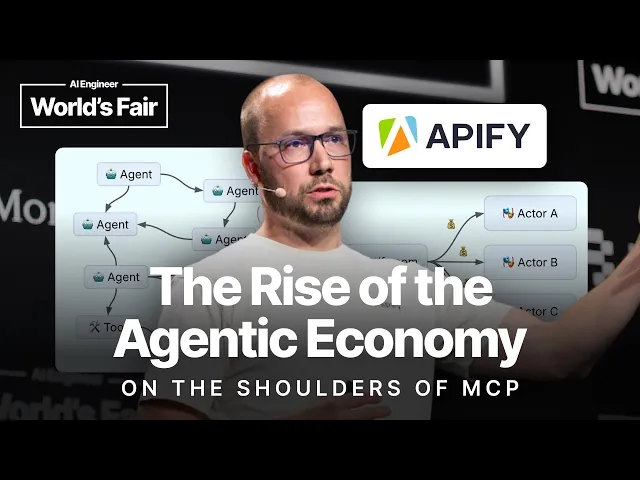The rise of the agentic economy on the shoulders of MCP

AI agents will transform our economy
In the evolving landscape of artificial intelligence, a revolution is quietly taking shape. Jan Curn's insights on the emerging "agentic economy" reveal how AI systems are transcending simple automation to become autonomous digital workers capable of handling complex tasks without human supervision. This shift has profound implications for how businesses operate and how we'll interact with technology in the coming years.
Key Points
-
AI is evolving from tools that require human operation to autonomous agents that can perform complex workflows independently, creating a new layer in the digital economy where these agents will increasingly handle tasks, make decisions, and engage with other systems.
-
Model-code-plugin (MCP) architecture represents a significant advancement, combining large language models with coding capabilities and specialized tools to create AI systems that can navigate the web, use applications, and solve problems more effectively than previous approaches.
-
The shift to agentic AI is being accelerated by market forces, with major tech companies already positioning themselves with offerings like OpenAI's GPT Agents, Anthropic's Claude, and Google's Bard, signaling a competitive race to develop the most capable autonomous systems.
The Dawn of Agent-Centric Computing
The most compelling insight from Curn's analysis is how the model-code-plugin architecture fundamentally changes what AI can accomplish. By integrating large language models with the ability to write code and leverage specialized tools, we're creating systems that can truly navigate the digital world as we do. This represents a paradigm shift from our current app-centric computing model to an agent-centric one, where AI doesn't just help us use applications—it handles entire workflows on our behalf.
This matters because it fundamentally alters the relationship between humans and technology. Instead of breaking down complex tasks into discrete steps that we execute using various apps, we'll increasingly describe high-level goals to AI agents that will determine how to accomplish them. This will transform user interfaces, business processes, and ultimately, entire industries. Companies that recognize and adapt to this shift early will have significant competitive advantages in terms of efficiency, innovation, and customer experience.
Beyond the Basics: The Broader Implications
What Curn doesn't fully explore is how this technological shift will reshape organizational structures. As AI agents become more capable, businesses will need to reimagine how human and digital workers collaborate.
Recent Videos
How To Earn MONEY With Images (No Bullsh*t)
Smart earnings from your image collection In today's digital economy, passive income streams have become increasingly accessible to creators with various skill sets. A recent YouTube video cuts through the hype to explore legitimate ways photographers, designers, and even casual smartphone users can monetize their image collections. The strategies outlined don't rely on unrealistic promises or complicated schemes—instead, they focus on established marketplaces with proven revenue potential for image creators. Key Points Stock photography platforms like Shutterstock, Adobe Stock, and Getty Images remain viable income sources when you understand their specific requirements and optimize your submissions accordingly. Specialized marketplaces focusing...
Oct 3, 2025New SHAPE SHIFTING AI Robot Is Freaking People Out
Liquid robots will change everything In the quiet labs of Carnegie Mellon University, scientists have created something that feels plucked from science fiction—a magnetic slime robot that can transform between liquid and solid states, slipping through tight spaces before reassembling on the other side. This technology, showcased in a recent YouTube video, represents a significant leap beyond traditional robotics into a realm where machines mimic not just animal movements, but their fundamental physical properties. While the internet might be buzzing with dystopian concerns about "shape-shifting terminators," the reality offers far more promising applications that could revolutionize medicine, rescue operations, and...
Oct 3, 2025How To Do Homeless AI Tiktok Trend (Tiktok Homeless AI Tutorial)
AI homeless trend raises ethical concerns In an era where social media trends evolve faster than we can comprehend them, TikTok's "homeless AI" trend has sparked both creative engagement and serious ethical questions. The trend, which involves using AI to transform ordinary photos into images depicting homelessness, has rapidly gained traction across the platform, with creators eagerly jumping on board to showcase their digital transformations. While the technical process is relatively straightforward, the implications of digitally "becoming homeless" for entertainment deserve careful consideration. The video tutorial provides a step-by-step guide on creating these AI-generated images, explaining how users can transform...
